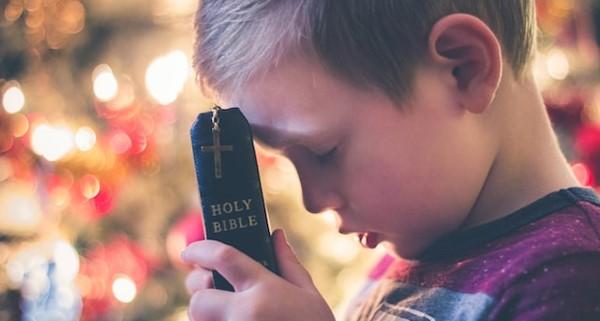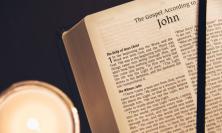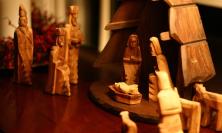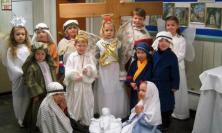Peter Edmonds SJ reflects on the readings for the first week of Christmastide.
25 December, Christmas Day (daytime Mass): Spoken through his Son
Isaiah 52:7-10; Hebrews 1:1-6; John 1:1-18
‘God has never said to any angel: “You are my Son, today I have become your father”.’ (Hebrews 1:5).
In our modern world, we choose different means to reach our destination. We may select to travel by road, by air, by sea. Likewise, we may approach the Christmas story by varied routes. The way selected for the first two Masses of Christmas is by means of the story given to us in Luke’s Gospel which tells of the birth of Jesus in a manger in Bethlehem and the visit of the shepherds.
In this third Mass of Christmas, we are invited to tread different paths. The better known of the two offered is through the beginning of the gospel of John which begins its Christmas story before the beginning of the world. Less familiar is the opening of the Letter to the Hebrews appointed as our second reading. This is the solemn opening of a long sermon preached by an unknown author to an unknown congregation, but so respected did this sermon become that it was included in our New Testament.
We are privileged to savour it today. We admire its majestic language and profound doctrine. We visualise the prophets of long ago and the angels worshipping God in his glory. We have the work of Christ described in a nutshell: he made purification for our sins and has taken his seat at the right hand of ‘the Majesty on high’. He fulfils the ancient scriptures. We hear the voice of God the Father speaking about the Son whose human birth we celebrate today. God himself joins in our Christmas celebrations.
Prayer
Father, you have provided us with many and varied ways to commemorate the human birth of your Word made flesh. May these enrich our prayer and improve the quality of our lives which we live in joyful and faithful response. We make this prayer through the same Christ our Lord.
26 December, St Stephen: Faithful until death
Readings: Acts 6:8-10; 7:54-8:1; Matthew 10:17-22
‘Stephen was filled with grace and power and began to work miracles and great signs among the people.’ (Acts 6:8)
Christmas celebrations are not over in a day. They continue for days afterwards and are all the better if they are enlivened by good company. Traditionally great feasts in the Church’s calendar have been followed by ‘octaves’, solemn days that prolonged the joy of the original. Christmas week is such a week. This is illuminated by a series of persons and events which extend its significance.
On this first day after Christmas, we celebrate St Stephen. His name means ‘crown’. Certainly, he won the crown of martyrdom. But he deserves a crown on other grounds. According to the Acts of the Apostles, in life he was full of faith and the Holy Spirit. He worked miracles and great signs. His wisdom expressed itself in a profound knowledge and understanding of the scriptures. In death, he showed that he was indeed a second Christ. Like him, he died forgiving his executioners. Christ died handing on his spirit to his Father. Stephen died offering his spirit to the ‘Lord Jesus’. He saw him as the ‘Son of Man’, standing at the right hand of God. This was a traditional posture of prayer. Christ was interceding for him.
Stephen is honoured as the first martyr; two thousand years have passed and he has had many successors. In our own time, people still suffer persecution and worse for the sake of religious truth and commitment. Today we remember them and pray for them, especially in these days of Christmas. Stephen is praying with us.
Prayer
Father, many are the examples and models you have raised up in the Church for our instruction and imitation. May we learn from the life and death of Stephen both how to live in your grace and how to die, confident in your mercy. Through your Son, Christ our Lord.
27 December, St John: He saw and believed
I John 1:1-4; John 20:2-8
‘We are writing this to you to make our own joy complete.’ (1 John 1:4)
There are days when a whole nation smiles. This might be because of success in some sporting competition, such as a World Cup; it could be because of a happy event in a popular TV drama. This was the meaning of the word gospel in the secular world when the first gospels were written. Its religious meaning was captured by the prophet Isaiah when he spoke about the peace, good news and salvation brought by a messenger sent by God to announce the gospel. Today we celebrate the evangelist, the gospel writer we know as John.
In the writings attributed to him, we celebrate the life and light brought to us by Christ. We owe to him the expression, ‘God is love’. He reports the ‘new commandment’ Jesus gave his disciples that they should love one another. Tradition identifies him with the ‘Beloved Disciple’ who reclined next to Jesus at the Last Supper, who watched beneath the cross of Jesus with Mary, his mother, and was the first to enter the tomb of Jesus on Easter Day and to believe. Some believe him to be the John who wrote the book of Revelation which describes the creation of a new heaven and a new earth at the end of time.
There is a world to be discovered in the writings that bear his name. His gospel concludes with a personal address to all who hear and read it. He tells us that he writes that we too may believe that Jesus is the Christ, the Son of God, and that believing this, we may have life in his name. This must be our daily prayer.
Prayer
Lord, you have enriched and instructed your Church through the books of scripture. Teach us always to value these books, because in them, as the Second Vatican Council taught us, God the Father, who is in heaven, comes lovingly to meet his children and talk with them. Through Christ our Lord.
28 December, The Holy Innocents: Meeting with shadows
1 John 1:5-2:2; Matthew 2:3-18
‘A voice was heard in Ramah, sobbing and loudly lamenting; it was Rachel weeping for her children.’ (Matthew 2:18 [= Jeremiah 31:15])
In every age, including our own, tyrants use violence and murder as instruments of state policy. The Egyptian Pharaoh attempted to kill the infant Moses, together with other infant boys born to the Israelite slaves. King Herod reacted to the arrival of the Magi, looking for the ‘King of the Jews’, by taking their search as a threat to his own rule. He ordered the elimination of all the young boys who might prove to be such a king. This was the world into which Jesus, whom we venerate as king of peace, was born. Here is a shadow cast over the Christmas story.
Where does God fit into all this? Matthew tells us that he warned Joseph in a dream to take the boy to Egypt. Thus the child repeated the journey of his ancestors under Jacob into Egypt. Matthew also quotes the prophet Jeremiah. He chooses the only sad verse in Jeremiah’s 31st chapter. The chapter as a whole gives a message of hope, concluding with God’s promise to make a new covenant with his people. The evangelist understood that this new covenant came into effect with the death and resurrection of Christ.
Our first reading addresses another shadow, the presence of sin in the Christian community. Despite all that Christ had accomplished in his death and resurrection, sin was still a reality and only a liar could deny this. But we are assured that we have a remedy at hand; Christ himself is with God, the Father, acting in heaven as our ‘paraclete’, our advocate. Here, too, is a message of hope, to blot out shadows in our lives.
Prayer
Lord, the story of the Holy Innocents tells us how rough and brutal our world can be. You came into this world. But you told your disciples that you have overcome the world and we live as people of hope, who rely on your continuous love and protection. Through Christ our Lord.
29 December, the Holy Family: 'My Father's house'
1 Samuel 1:20-22, 24-28; 1 John 3:1-2, 21-24; Luke 2:41-52
‘His mother treasured all these things in her heart.’ (Luke 2:51)
We hear first from the first book of Samuel. Hannah, the aged mother of Samuel, reminds us of other women who gave birth to sons in their old age, such as Sarah, the mother of Isaac, and Elizabeth, the mother of John the Baptist. So grateful is Hannah that ‘the Lord remembered her’ that she presents her child to Eli, the priest of the temple at Shiloh, so that he can serve the Lord for ever. This child, Samuel, grew up to serve the Lord as his prophet and as such anticipates the Jesus whom we meet in the gospel.
John’s Gospel reminds us that those who accepted the Word made flesh received power to become ‘children of God’. Our reading from the first letter of John defines what becoming the children of God means. Such a privilege does not mean that we have already arrived at the peak of our Christian calling. We are expected to ‘believe in the name of Jesus’ and ‘love one another’. This is a unique New Testament description of the demands of the Christian life.
The only gospel story about the childhood of Jesus is significant for its own sake and for its relationship to the rest of Luke’s work. Since Simeon spoke his prophecy over the child and its mother, twelve years have passed. Each year, as was expected of a devout family, they would travel to Jerusalem for the Passover. But now he is twelve years old, the age when a Jewish boy was obliged to observe the Law, he does not return with his parents. After three days—for the reader, a hint of the future resurrection—he is found in the Temple, already displaying the wisdom that he would personify during his ministry. His mother, in tones of anguish, asks him why he had done this to them.
The reader recognises how the sword of which Simeon spoke has cut Jesus off from his earthly family and pierced the heart of Mary. In Jesus’s first recorded words, he explains that: ‘I must be busy with my Father’s affairs’. This statement helps us to understand the rest of the gospel, in which a divine necessity is at work and in which Jesus lives in close union with his Father until the end, but at this stage his mother cannot understand these truths. Although she had been informed about the identity of her son as the ‘Son of God’, she has to walk with other believers a path of non-understanding. Meanwhile, Jesus returns with his parents to Nazareth, where he lives a life of obedience to them.
Prayer
Father, on this feast of the Holy Family, we are invited to place ourselves in the Jerusalem Temple with Mary and Joseph, and the young Jesus, once lost and now found. As St Ignatius of Loyola recommended, may we enter into their company and seek fruit for ourselves from this Holy Family.
30 December: A widow in the Temple
1 John 2:12-17; Luke 2:36-40
There was a prophetess also, Anna the daughter of Phanuel, of the tribe of Asher. (Luke 2:36)
Only one person called Anna appears in the New Testament and we hear about her today. Her name is the Greek form of the name Hannah, the mother of the prophet Samuel, famous for her prayer of thanksgiving which provides a model for the Magnificat of Mary, the mother of Jesus. Our Anna is called a prophetess. Luke refers to the daughters of Philip as prophetesses and Peter on Pentecost day quotes the prophet Joel, who promised that God in the last days would cause the sons and daughters of his people to prophesy.
Anna was a widow. There are more widows in Luke’s gospel than in any other. Jesus would speak in Nazareth about the widow of Zarephath; he would cure the son of the widow of Nain and tell the parable about the widow who confronted an unjust judge. For Luke, the story of Zechariah was incomplete without the story of Elizabeth. Likewise, the story of Simeon is completed by that of Anna.
Anna completes the group that has assembled this week to take their place at our Christmas festivities. Her presence reminds us of the values of traditional piety identified as worship of God, fasting and prayer. The word used to describe the praise and thanks she gave to God is unique in the New Testament. The Greek tense tells us that she could not stop talking about the child whom Mary and Joseph had brought into the Temple. She is an example to us all.
Prayer
Father, many individuals play their part in the story of your Son in our world. May we value their presence and example. May we learn from them how to respond to the presence of your Son among us and, like the widow Anna, offer fitting prayer and worship. Through Christ our Lord.
31 December: We saw his glory
1 John 2:18-21; John 1:`1-18
‘The Word was made flesh, he lived among us, and we saw his glory.’ (John 1:14)
The Christmas story is one of the great stories of the world. It has inspired many an artist, is recorded in many a Christmas carol and told in many a nativity play. Children compete to impersonate familiar characters, and remember for years to come how proud they were to perform even a minor part like that of a shepherd or the innkeeper. They love to be part of the story.
But somehow, in the readings for our final Mass of the year, the familiar story and its well-known characters fade into the background. The gospel passage from John takes us back in time to before the world began, and tells us that even then, Christ was alive and active as the Son in the presence of God the Father. This Son came into our world as its light and its life. The Son identified himself with ourselves in becoming flesh. He came to his own people, but tragically his own people rejected him. They failed to recognise that he was the word which reveals God the Father to us.
But this was not the end of the story because at his coming, John the Baptist spoke out as his witness on his behalf. And now that Christ, the Son, has returned to the Father, the Christian community witnesses in this gospel how it has seen and continues to see the glory of God. When he spoke to the woman of Samaria, Jesus would exclaim: ‘If only you knew the gift of God’. He says the same to us every year when we celebrate Christmas. His glory is there for us to see.
Prayer
Lord, in your time with us on this earth, you cured the blind and healed the deaf. May we at Christmas time have eyes to see and ears to hear the truths behind the Christmas story, so we may witness to the goodness of God that it contains. Through Christ our Lord.






